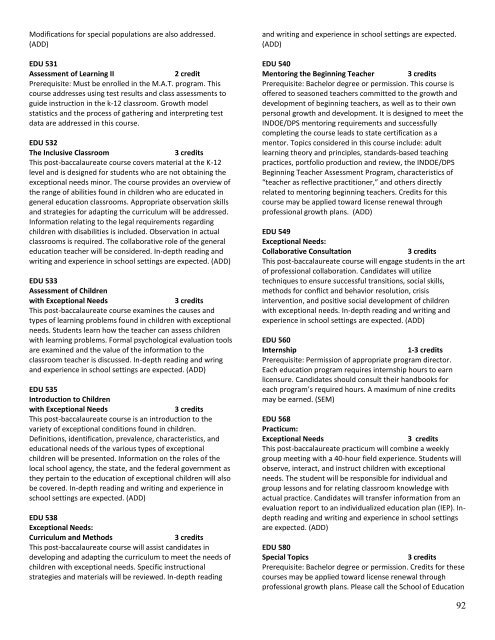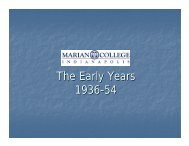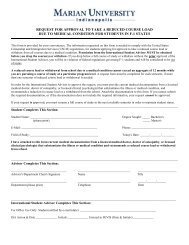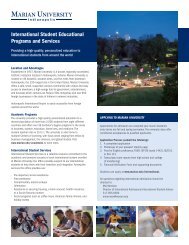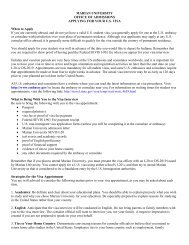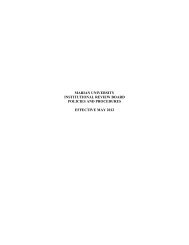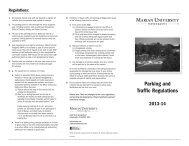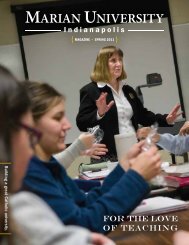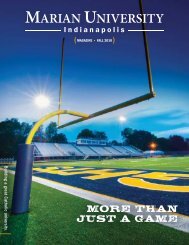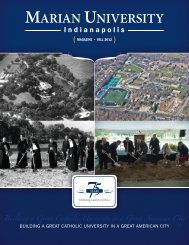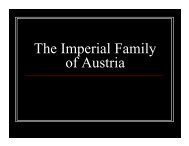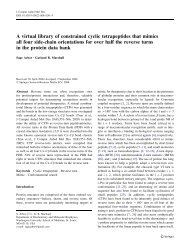2009-11 Marian University Course Catalog, fall 2010 edition
2009-11 Marian University Course Catalog, fall 2010 edition
2009-11 Marian University Course Catalog, fall 2010 edition
You also want an ePaper? Increase the reach of your titles
YUMPU automatically turns print PDFs into web optimized ePapers that Google loves.
Modifications for special populations are also addressed.<br />
(ADD)<br />
EDU 531<br />
Assessment of Learning II 2 credit<br />
Prerequisite: Must be enrolled in the M.A.T. program. This<br />
course addresses using test results and class assessments to<br />
guide instruction in the k-12 classroom. Growth model<br />
statistics and the process of gathering and interpreting test<br />
data are addressed in this course.<br />
EDU 532<br />
The Inclusive Classroom 3 credits<br />
This post-baccalaureate course covers material at the K-12<br />
level and is designed for students who are not obtaining the<br />
exceptional needs minor. The course provides an overview of<br />
the range of abilities found in children who are educated in<br />
general education classrooms. Appropriate observation skills<br />
and strategies for adapting the curriculum will be addressed.<br />
Information relating to the legal requirements regarding<br />
children with disabilities is included. Observation in actual<br />
classrooms is required. The collaborative role of the general<br />
education teacher will be considered. In-depth reading and<br />
writing and experience in school settings are expected. (ADD)<br />
EDU 533<br />
Assessment of Children<br />
with Exceptional Needs 3 credits<br />
This post-baccalaureate course examines the causes and<br />
types of learning problems found in children with exceptional<br />
needs. Students learn how the teacher can assess children<br />
with learning problems. Formal psychological evaluation tools<br />
are examined and the value of the information to the<br />
classroom teacher is discussed. In-depth reading and wring<br />
and experience in school settings are expected. (ADD)<br />
EDU 535<br />
Introduction to Children<br />
with Exceptional Needs 3 credits<br />
This post-baccalaureate course is an introduction to the<br />
variety of exceptional conditions found in children.<br />
Definitions, identification, prevalence, characteristics, and<br />
educational needs of the various types of exceptional<br />
children will be presented. Information on the roles of the<br />
local school agency, the state, and the federal government as<br />
they pertain to the education of exceptional children will also<br />
be covered. In-depth reading and writing and experience in<br />
school settings are expected. (ADD)<br />
EDU 538<br />
Exceptional Needs:<br />
Curriculum and Methods 3 credits<br />
This post-baccalaureate course will assist candidates in<br />
developing and adapting the curriculum to meet the needs of<br />
children with exceptional needs. Specific instructional<br />
strategies and materials will be reviewed. In-depth reading<br />
and writing and experience in school settings are expected.<br />
(ADD)<br />
EDU 540<br />
Mentoring the Beginning Teacher 3 credits<br />
Prerequisite: Bachelor degree or permission. This course is<br />
offered to seasoned teachers committed to the growth and<br />
development of beginning teachers, as well as to their own<br />
personal growth and development. It is designed to meet the<br />
INDOE/DPS mentoring requirements and successfully<br />
completing the course leads to state certification as a<br />
mentor. Topics considered in this course include: adult<br />
learning theory and principles, standards-based teaching<br />
practices, portfolio production and review, the INDOE/DPS<br />
Beginning Teacher Assessment Program, characteristics of<br />
“teacher as reflective practitioner,” and others directly<br />
related to mentoring beginning teachers. Credits for this<br />
course may be applied toward license renewal through<br />
professional growth plans. (ADD)<br />
EDU 549<br />
Exceptional Needs:<br />
Collaborative Consultation 3 credits<br />
This post-baccalaureate course will engage students in the art<br />
of professional collaboration. Candidates will utilize<br />
techniques to ensure successful transitions, social skills,<br />
methods for conflict and behavior resolution, crisis<br />
intervention, and positive social development of children<br />
with exceptional needs. In-depth reading and writing and<br />
experience in school settings are expected. (ADD)<br />
EDU 560<br />
Internship 1-3 credits<br />
Prerequisite: Permission of appropriate program director.<br />
Each education program requires internship hours to earn<br />
licensure. Candidates should consult their handbooks for<br />
each program’s required hours. A maximum of nine credits<br />
may be earned. (SEM)<br />
EDU 568<br />
Practicum:<br />
Exceptional Needs 3 credits<br />
This post-baccalaureate practicum will combine a weekly<br />
group meeting with a 40-hour field experience. Students will<br />
observe, interact, and instruct children with exceptional<br />
needs. The student will be responsible for individual and<br />
group lessons and for relating classroom knowledge with<br />
actual practice. Candidates will transfer information from an<br />
evaluation report to an individualized education plan (IEP). Indepth<br />
reading and writing and experience in school settings<br />
are expected. (ADD)<br />
EDU 580<br />
Special Topics 3 credits<br />
Prerequisite: Bachelor degree or permission. Credits for these<br />
courses may be applied toward license renewal through<br />
professional growth plans. Please call the School of Education<br />
92


